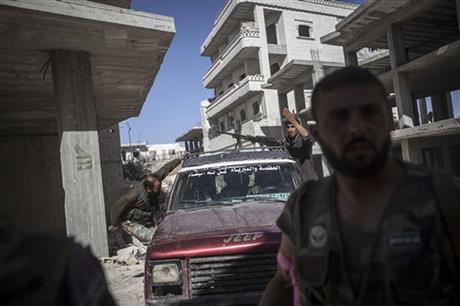
In this Monday, Oct. 07, 2013 photo, opposition fighters prepare themselves for the battle during an attack on the Wadi al-Deef military post at the frontline in Maaret al-Numan in the Idlib province countryside of Syria. With much of the northern countryside now in opposition hands, a cat-and-mouse game has emerged over the past year as the rebels try to cut the government supply lines to the regime’s remaining troops in the north. (AP Photo)
BEIRUT (AP) — Syrian government warplanes bombed rebel positions near a strategic northern city on Tuesday, activists said, as international inspectors toured production and storage sites of the country’s chemical weapons arsenal.
The rebels captured Maaret al-Numan a year ago, after systematically seizing the army’s outposts in the city, along astride a major supply route linking the capital, Damascus with the contested Idlib region and Syria’s largest city, Aleppo.
Fighting has flared up there in recent days, even as government forces and opposition fighters remain locked in a bloody, block-by-block fight for Aleppo since rebels launched an assault on it 15 months ago.
The Britain-based Syrian Observatory for Human Rights says fighter jets twice hit opposition-held areas Tuesday near the city, and heavy fighting then broke out at a nearby army base. The group says there were casualties in the fighting but gave no specifics.
Dramatic footage shot by The Associated Press showed a group of 45 young rebel fighters launching a surprise attack on the military base, and others deploying improvised cannons and makeshift mortars. Some are also seen firing anti-aircraft weapons at attacking government helicopters.
The Syrian army responded with airstrikes and shelling to block the rebel advance, killing at least one of the fighters Monday, opposition fighters told AP.
The fight for the base is part of the ongoing, broader struggle for control of northern Syria where the opposition controls large swathes of territory captured from President Bashar Assad’s troops.
“We are ready to move on our military operation, in order to remove the enemy check-points and the army present in the Wadi Deif area and army base,” one of the fighters said before heading into the battle. “God is great and He is the one who protects us.”
Most of the northern countryside is in the hands of anti-Assad fighters, while the government is holding out in isolated military bases and inside major cities.
In The Hague, the chief of the global chemical weapons watchdog briefed member states on progress in the high-stakes, high-risk mission to rid Syria of its poison gas stockpile.
Ahmet Uzumcu, director-general of the Organization for the Prohibition of Chemical Weapons, spoke to the group’s 41-nation Executive Council at the start of a four-day meeting as inspectors continued their mission.
Earlier Tuesday, teams of weapons inspectors were seen leaving their Damascus hotel in several U.N.-marked vehicles. It was not clear where they were headed and what their task for the day was.
On Sunday and for the first time since the mission began last week, Syrian personnel working under the supervision of the OPCW experts began destroying the country’s chemical arsenal and equipment used to produce it.
The joint OPCW-U.N. mission to scrap Syria’s chemical program stems from a deadly Aug. 21 attack on opposition-held suburbs of Damascus in which the U.N. has determined the nerve agent sarin was used. Hundreds of people were killed, including many children. The U.S. and Western allies accuse the Syrian government of being responsible, while Damascus blames the rebels.



